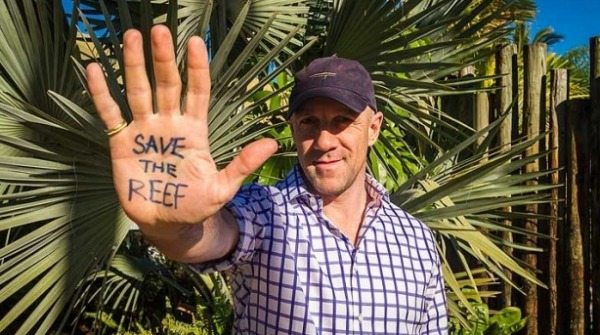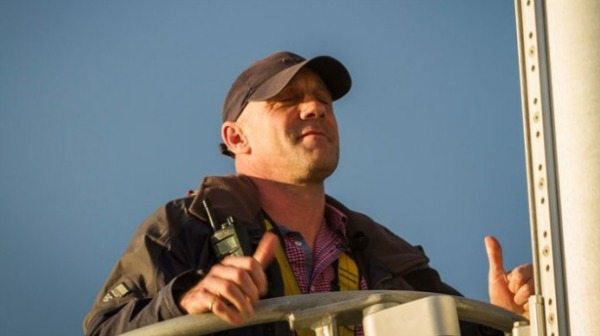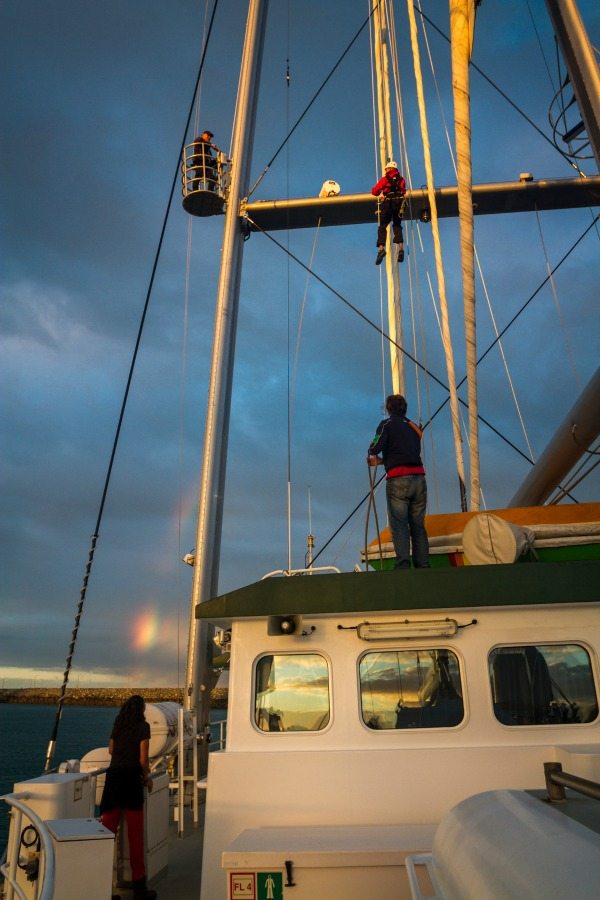I’m scared of heights – tall buildings, cliff tops and lifts. Glass lifts really get my blood pumping. Even the thought of it makes me nervous. But I’m fine with aeroplanes and helicopters, which kind of sounds a bit contradictory.
Posted in WA Today – July 6th 2015
Perth based geologist Ric Davies was out to show support for a responsible resources industry
On Saturday, I faced my fears and made my way 50 metres up to the top of the main mast on the Greenpeace ship, Rainbow Warrior to show my support for a responsible resources industry.
Did I mention I’m also a geologist and I work in, and support, the resources industry?
Mr Davies fights his fear of heights at the top of the 50 metre mast on Greenpeace ship, Rainbow Warrior
We all use natural resources extensively in our daily lives, from the moment we wake up in fact. The fact that toothpaste contains mineral sands really spins me out.
The products of the resources industry are everywhere – cars, phones, computers, houses, hospitals, transport, power, even money. All of these come from the ground, from mineral resources and human ingenuity. There’s a saying that “what’s yours is mined’ which, when you think about it, is very true.
But that’s not to say it should be open slather for mining.
Mr Davies scales up the ship’s mast – despite his fear of heights.
At a global level it has been widely acknowledged that some areas should be off limits – Antarctica, for example. In Australia it has long been recognised that there are some areas that should not be mined, such as our National Parks. The Western Australian government also recently banned coal mining in the Margaret River. So we agree, mining in some areas is not a responsible thing to do.
In this context and looking to the future we know we have to drastically reduce our carbon emissions. And as United States President Barack Obama has said, “We don’t have time for a meeting of the flat-Earth society”.
The reality is that coal is going to be gradually replaced by other sources of energy.
Coal usage will reduce, and the resources industry will adapt, as it always has. The change won’t happen overnight and no doubt there will be some new coal projects established along the way.
In contrast to this decline, however, the increasing role of renewables is tangible.
Even ignoring climate change technological advances are moving at such a pace that renewable energy as the next major energy source is now inevitable.
As David Attenborough has said, “If we find ways of generating and storing power from renewable resources, we will make the problem with oil and coal disappear – because economically, we’ll wish to use these other methods”.
There are some fine examples of human ingenuity addressing this issue. Norsk Hydro first generated carbon neutral hydrogen from renewables over 100 years ago and, combining it with atmospheric nitrogen, revolutionised the production of fertiliser for agriculture.
More recently, Audi has developed a car that runs on carbon neutral synthetic methane generated from wind power – an amazing piece of engineering with profound implications.
Advances in renewable energy storage and transport make for the prospect of, not just domestic energy production, but a renewable energy export industry in its own right and on a grand scale.
Australia is perfectly positioned to be a champion of this new industry and to supply to the world with plentiful carbon neutral energy. We have sunlight and land in abundance and a stable jurisdiction for this industry to grow.
So while the rest of the world is talking about reducing carbon emissions, Australia’s proposal to open up a new coal mining province in the Galilee Basin, including the Carmichael coal mine, and potentially double its emissions is clearly not a responsible thing to do.
There is a healthy debate to be had about the resources industry and climate change, but it shouldn’t be a polarised one.
I support a responsible resources industry. The industry has thrived on innovation and its evolution in the past 100 years has been nothing short of staggering.The next chapter will include renewable resources on a vast scale.
Like I said, I’m scared of heights but I’m not afraid of flying.
Perth geologist Ric Davies participated in a Greenpeace-organised event called “Acts of Courage”. Those involved pledged to face their own worst nightmare to inspire more people to join the movement against the Carmichael coal mine and Abbot Point port expansion at the Great Barrier Reef.





